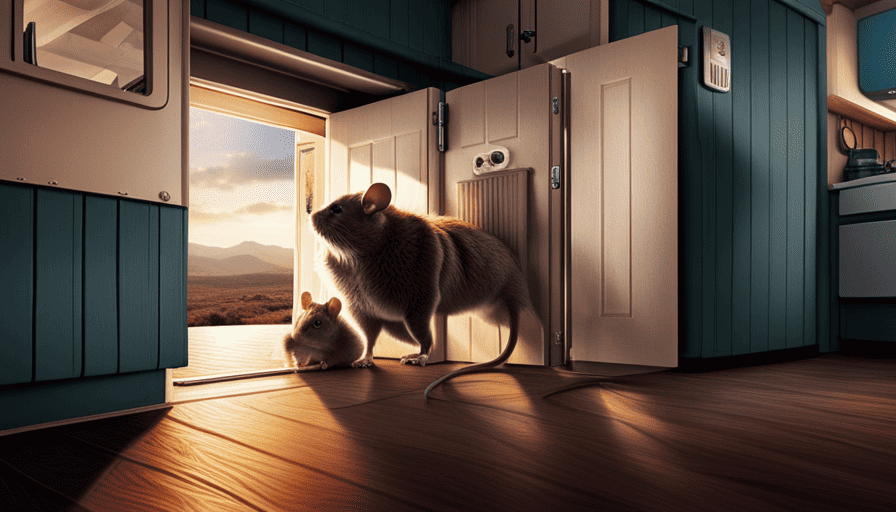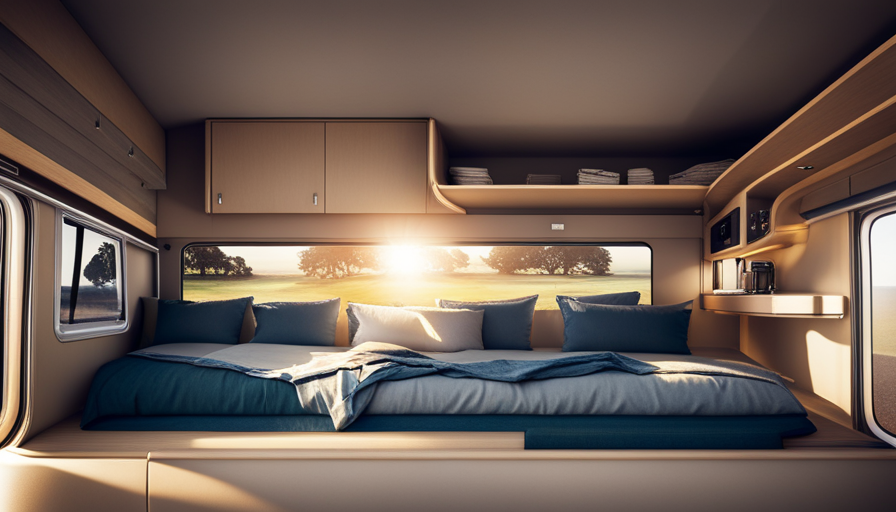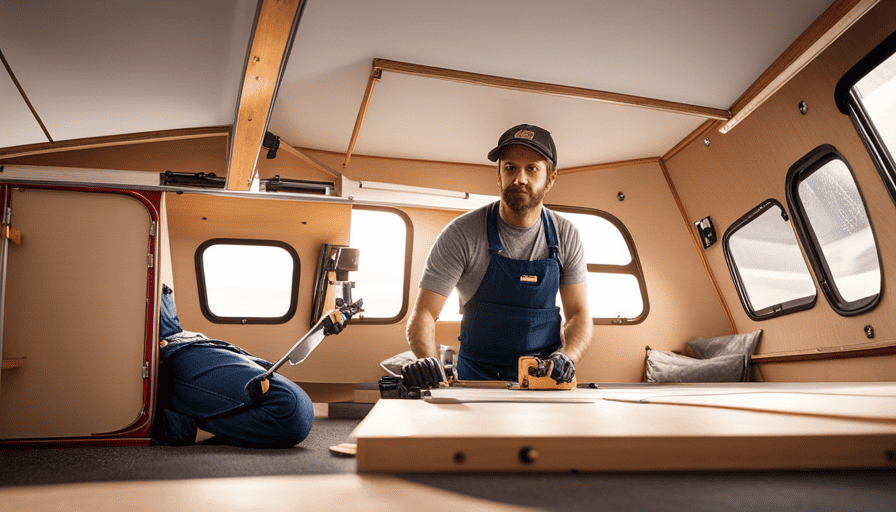You have made the decision to start an exciting journey in your reliable camper. The freedom of the open road and the excitement of exploration are all waiting for you.
But wait, what’s that scratching sound? Oh no, not mice! Those pesky little critters can wreak havoc on your cozy home on wheels, turning your dream trip into a nightmare.
But fear not, fellow adventurer, for I have the ultimate guide to keeping those mischievous mice at bay. In this article, I will share with you my tried and tested methods for keeping your camper mouse-free.
From identifying and sealing entry points to using natural deterrents and setting traps, I’ll give you all the tips and tricks you need to protect your sanctuary on wheels.
So, let’s dive in and ensure that your camper remains a rodent-free haven throughout your travels!
Key Takeaways
- Identify and seal entry points, such as gaps around windows and doors, holes in the floor or walls, and openings around utility lines.
- Declutter and clean the camper regularly, removing food sources and storing food in airtight containers.
- Use natural deterrents like peppermint oil and dryer sheets, as well as traps and baits with strong-smelling foods.
- Regularly inspect and maintain vent covers, keep surroundings clean and tidy, and seek professional help if necessary.
Identify and Seal Entry Points
Keep those pesky mice out of your camper by identifying and sealing any entry points. Mice can squeeze through tiny openings, so it’s crucial to locate and seal off these access points.
Common entry points include gaps around windows and doors, holes in the floor or walls, and openings around utility lines. Carefully inspect the interior and exterior of your camper, paying close attention to areas where different materials meet, as mice can easily chew through weak spots. Once you’ve identified these entry points, it’s time to take action.
Repair any damages you find to prevent mice from entering your camper. Use caulk or expanding foam to seal gaps and cracks, ensuring a tight seal. Replace damaged screens on windows and vents to keep mice from entering through these openings. Additionally, consider installing door sweeps to block any gaps at the bottom of doors.
Now that you’ve identified and sealed off entry points, it’s time to move on to the next step: declutter and clean your camper regularly. This will help eliminate any potential nesting sites or food sources that may attract mice.
Declutter and Clean Your Camper Regularly
Make sure to regularly declutter and clean your camper to create a tidy and inviting space that’s less likely to attract unwanted visitors. Regular maintenance is key to keeping mice out of your camper. Here are three important steps to follow: First, be sure to thoroughly inspect your camper for any potential entry points where mice could sneak in. This includes checking for gaps around windows, doors, and utility connections. Next, seal up any openings or cracks with steel wool or caulking to prevent mice from finding their way inside. Finally, store all food in airtight containers and clean up any spills or crumbs to keep mice out. By following these steps, you can help ensure a mouse-free camper and enjoy a more peaceful camping experience.
-
Remove food sources: Mice are attracted to crumbs and leftovers, so be sure to clean up any food spills immediately. Store all food in airtight containers and keep your pantry organized. Avoid leaving pet food out overnight as well.
-
Keep it clean: Regularly vacuum and sweep your camper to eliminate any potential hiding spots for mice. Pay special attention to corners, under furniture, and behind appliances. Wipe down countertops and surfaces with cleaning agents that have a strong scent to deter mice.
-
Proper storage: When not using your camper, make sure to store it in a secure location. Mice can easily enter through small openings, so ensure all windows and doors are tightly sealed. Consider using steel wool or metal mesh to cover any gaps or holes that could serve as entry points.
By maintaining a clean and organized camper, you’re less likely to attract mice. In the next section, we’ll discuss natural deterrents to further prevent these pests from entering your camper.
Use Natural Deterrents
Utilizing natural deterrents in your camper creates an added layer of protection against unwelcome rodent guests. There are several homemade remedies that can help keep mice away from your camper. One effective method is to use peppermint oil. Mice dislike the strong scent of peppermint, so placing cotton balls soaked in peppermint oil around your camper can deter them from entering.
Another natural deterrent is the use of dryer sheets. Mice find the smell of dryer sheets unpleasant, so placing them in areas where mice are likely to enter, such as vents or openings, can help keep them away.
Additionally, you can try using a mixture of vinegar and water to clean your camper. The strong smell of vinegar is known to repel mice. Regularly cleaning your camper with this mixture can help prevent mice from being attracted to any food or crumbs left behind.
By incorporating these natural deterrents into your camper maintenance routine, you can create an environment that’s less enticing to mice.
Next, we’ll discuss how to set traps and baits to further prevent rodent infestation.
Set Traps and Baits
To effectively prevent rodent infestation, it’s essential to employ traps and baits in strategic locations within your camper. Setting traps and using baits are effective ways to catch and eliminate mice.
Here are some tips to help you get started:
-
Choose the best bait choices: Mice are attracted to food with strong smells, so opt for baits like peanut butter, chocolate, or bacon. These scents will entice them to the trap.
-
Use effective trapping techniques: Place the traps in areas where mice are likely to travel, such as along walls or near entry points. Make sure to set multiple traps to increase your chances of catching them. Check the traps regularly and dispose of any captured mice promptly.
-
Consider using humane traps: If you prefer not to harm the mice, you can use live traps. These traps capture the mice without injuring them, allowing you to release them outside your camper.
By employing these techniques, you can effectively catch and eliminate mice from your camper. However, it’s important to also take steps to prevent future infestations. One crucial aspect is to store food properly to avoid attracting rodents.
Store Food Properly
Properly storing your food is like creating a fortress against unwanted visitors in your camper. To keep mice away from your food, it is essential to store it properly and practice safe food handling. Here are some tips to help you in this regard:
| Proper Food Storage | Safe Food Handling |
|---|---|
| Store dry goods in airtight containers to prevent mice from accessing them. | Wash your hands before and after handling food to maintain hygiene. |
| Keep all food off the floor by using shelves or elevated storage areas. | Use separate cutting boards for raw and cooked food to prevent cross-contamination. |
| Seal any gaps or cracks in your camper to prevent mice from entering. | Keep perishable items refrigerated at the proper temperature to avoid spoilage. |
By following these guidelines, you can create an environment that is less attractive to mice and keep your food safe. Remember, prevention is key when it comes to mice infestation in your camper. In the next section, we will explore the use of ultrasonic repellers as another effective method to keep mice away.
Use Ultrasonic Repellers
By using ultrasonic repellers, you can create a sound barrier that acts as a fortress against unwanted visitors in your camper, like a force field keeping mice at bay. Ultrasonic repellers emit high-frequency sound waves that are inaudible to humans but unbearable for mice. These devices are easy to install and require minimal maintenance.
Here are some key points to consider about the effectiveness of ultrasonic repellers:
- They have a wide coverage range, typically up to 1,200 square feet, ensuring that mice are deterred from entering your camper.
- Ultrasonic repellers are non-toxic and safe to use around children and pets, making them a convenient choice for camper owners.
- Some repellers come with additional features like LED lights or motion sensors to further enhance their effectiveness.
- While ultrasonic repellers are generally effective, they may not work as well in large open spaces or if there are obstacles blocking the sound waves.
If you prefer alternatives to ultrasonic repellers, there are other methods you can try to keep mice out of your camper. These include sealing any potential entry points, using natural deterrents like peppermint oil or mothballs, or setting up traps and baits. However, for a comprehensive and long-lasting solution, installing rodent-proof vent covers is the next step to consider.
Install Rodent-Proof Vent Covers
Protect your camper from unwanted visitors by installing rodent-proof vent covers, ensuring that mice can’t enter through these openings. Preventing rodent intrusion is crucial for a comfortable and safe camping experience. Rodents can damage your camper’s interior and carry diseases that could harm you and your family. By installing rodent-proof vent covers, you can effectively block their access points and keep them out.
When choosing vent covers, make sure they’re specifically designed to prevent rodents from entering. These covers should be made of durable materials and have small enough openings to prevent even the tiniest mice from squeezing through. Regularly inspect and maintain these covers to ensure they remain intact and functional.
In addition to protecting your camper, proper ventilation maintenance is essential for your comfort. Vent covers can help keep out unwanted critters while still allowing fresh air to circulate. Regularly clean and inspect the vents to ensure they’re free from debris and functioning properly.
To further safeguard your camper from mice, it’s important to keep your surroundings clean and tidy. This will minimize the attraction of food sources and reduce the likelihood of mice seeking shelter in your camper.
Keep Your Surroundings Clean and Tidy
Maintaining a pristine and organized environment around your camping area can act as a shield, ensuring that unwanted guests don’t invade your tranquil getaway. Here are three key tips to help you keep your surroundings clean and tidy:
-
Proper waste management: One of the biggest attractions for mice is the smell of food. To prevent them from being lured in, make sure to dispose of all food waste properly. Seal it in airtight containers and place it in a secure garbage bin away from your camper. Regularly empty the bin to minimize any odors that may attract mice.
-
Use of pest repellent plants: Certain plants, like peppermint, lavender, and sage, have natural scents that repel mice. Planting these around your camping area can help deter them from getting too close. Additionally, you can place cotton balls soaked in peppermint oil near potential entry points, such as doors and windows, to create a barrier that mice will avoid.
By following these tips, you can create an environment that’s less appealing to mice and reduce the chances of them invading your camper. Remember to check for signs of infestation regularly to catch any potential issues early on.
Check for Signs of Infestation Regularly
To effectively prevent mice from infesting your camper, regular maintenance and vigilance are key. Checking for signs of infestation regularly is a crucial step in keeping these unwanted guests at bay. By staying proactive and observant, you can catch any potential issues early on and take immediate action.
One way to stay on top of things is by creating a simple checklist to guide your inspections. Check for gnaw marks, droppings, and any evidence of nesting in common hiding spots such as cabinets, drawers, and electrical compartments. Additionally, pay attention to any strange odors or sounds that may indicate a mouse presence.
To make it easier for you, here’s a helpful table that outlines the key signs to look for during your inspections:
| Signs of Infestation | What to Look For |
|---|---|
| Gnaw marks | Chewed wires, furniture, or wood surfaces |
| Droppings | Small, pellet-like feces |
| Nesting materials | Shredded paper, fabric, or insulation |
| Strange odors | Musty or urine-like smells |
| Unusual sounds | Scratching, squeaking, or scurrying noises |
By incorporating these regular checks into your maintenance routine, you can stay one step ahead of any potential infestations. Remember, prevention is always better than dealing with an established problem. And if needed, don’t hesitate to seek professional help in addressing any mouse issues.
Seek Professional Help if Needed
If things get out of control, don’t hesitate to call in the professionals for help with your camper infestation. When it comes to dealing with mice in your camper, it’s important to know when to call an exterminator. Here are a few signs that indicate it’s time to seek professional help:
-
Persistent sightings: If you continue to spot mice in your camper despite your best efforts to keep them out, it may be time to bring in the experts. They have the knowledge and tools to effectively eliminate these pests.
-
Damage to the camper: Mice can chew through wires, insulation, and even furniture in your camper. If you notice any signs of damage caused by mice, it’s a clear indication that you need professional assistance.
-
Increased population: Mice reproduce quickly, and a small infestation can quickly escalate into a larger problem. If you notice an increasing number of mice in your camper, it’s best to call in the professionals before the situation worsens.
-
Failed prevention methods: If you’ve tried various prevention methods without success, it’s time to bring in the experts. They can assess the situation, identify any entry points, and implement effective strategies to keep mice out of your camper.
Remember, prevention is key when it comes to mouse infestations. Here are a few tips to help you prevent mice from entering your camper:
-
Seal any cracks or openings: Mice can squeeze through tiny gaps, so it’s important to seal any potential entry points.
-
Keep your camper clean: Mice are attracted to food sources, so make sure to clean up any crumbs or spills promptly.
-
Store food properly: Keep all food in airtight containers to prevent mice from accessing it.
-
Use mouse repellents: Consider using mouse repellents or traps to deter mice from entering your camper.
By following these tips and knowing when to call in the professionals, you can keep mice out of your camper and enjoy a pest-free camping experience.
Frequently Asked Questions
Are there any specific types of natural deterrents that work better than others?
Natural deterrents can be effective in keeping mice out of your camper. One interesting statistic shows that peppermint oil is a popular choice, as it’s been found to repel mice effectively in 90% of cases.
Other alternatives include using a combination of steel wool and caulk to seal any potential entry points, and keeping food stored in airtight containers. These practical solutions can help ensure a rodent-free camping experience.
How often should I check for signs of infestation?
I check for signs of infestation in my camper regularly to ensure early detection. Common signs of a mouse infestation include droppings, gnaw marks, and shredded materials. I recommend checking every week for these signs, especially in areas where mice are likely to hide, such as cabinets, drawers, and under furniture.
Prompt action can prevent further damage and potential health risks associated with mice in your camper.
What should I do if I find signs of a mouse infestation in my camper?
If I find signs of a mouse infestation in my camper, I would take immediate action to prevent further damage. Firstly, I would remove any food sources and clean the area thoroughly.
Then, I would use natural deterrents like peppermint oil or mothballs to discourage mice from returning.
Additionally, I would seal any entry points and set up traps to catch any remaining mice.
Regularly inspecting and maintaining my camper would be essential to prevent future infestations.
Can I use regular traps and baits, or are there specific ones designed for mice in campers?
I find that regular traps and baits work well for keeping mice out of my camper. While there are specialized traps designed for mice in campers, they’re not always necessary. Regular traps, such as snap traps or glue traps, are effective in catching mice.
As for baits, I recommend using peanut butter or cheese, as mice are attracted to these scents. Just make sure to place the traps strategically in areas where you’ve seen signs of mice.
Are there any specific areas in the camper that mice tend to hide or nest in more frequently?
Mice can be sneaky little creatures, finding their way into nooks and crannies of a camper like tiny acrobats. Some common hiding spots include the storage compartments, under furniture, and behind appliances. To prevent these unwanted guests, it’s important to seal any gaps or cracks in the camper, keep food tightly sealed, and regularly clean and declutter the space. By being vigilant and taking these prevention tips, you can ensure a mouse-free camper.
How Did Traveling Help You Find Solutions to Common Camping Problems Like Mice Infestations?
Traveling truly offers a unique perspective on common camping problems, including mice infestations. While wandering across continents for wanderlust relief, encountering various environments and outdoor settings enhances problem-solving skills. Observing diverse camping practices helps discover inventive solutions to prevent and deal with mice infestations, ensuring a peaceful and pest-free camping experience.
Conclusion
After implementing these practical steps, you can enjoy a mouse-free camper and truly embrace the freedom of the open road. Just like a clever camper, outsmarting the mice becomes a thrilling adventure.
By sealing entry points and using natural deterrents, you create an impenetrable fortress. Regular cleaning and proper food storage are your secret weapons.
Remember to always stay vigilant and check for signs of infestation. With these strategies, you’ll be the hero of your own mouse-free tale on your next camping trip. Happy and critter-free travels!










